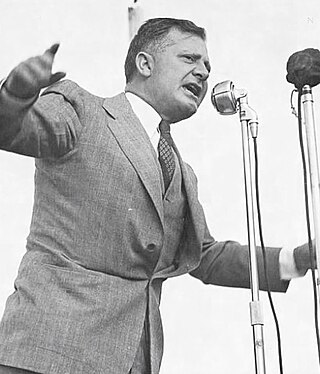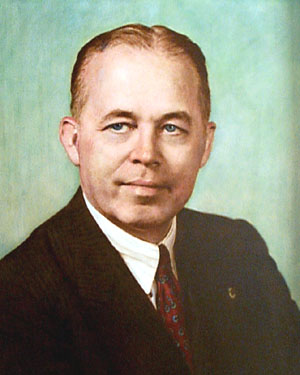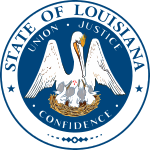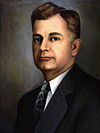
The 1936 United States presidential election was the 38th quadrennial presidential election, held on Tuesday, November 3, 1936. In the midst of the Great Depression, incumbent Democratic President Franklin D. Roosevelt defeated Republican Governor Alf Landon of Kansas. Roosevelt won the highest share of the popular vote (60.3%) and the electoral vote since the largely uncontested 1820 election. The sweeping victory consolidated the New Deal Coalition in control of the Fifth Party System.

Huey Pierce Long Jr., nicknamed "The Kingfish", was an American politician who served as the 40th governor of Louisiana from 1928 to 1932 and as a United States senator from 1932 until his assassination in 1935. He was a left-wing populist member of the Democratic Party and rose to national prominence during the Great Depression for his vocal criticism of President Franklin D. Roosevelt and his New Deal, which Long deemed insufficiently radical. As the political leader of Louisiana, he commanded wide networks of supporters and often took forceful action. A controversial figure, Long is celebrated as a populist champion of the poor or, conversely, denounced as a fascistic demagogue.

Earl Kemp Long was an American politician who served as the 45th governor of Louisiana for nine years. A member of the Democratic Party, he held the same position that his brother, Huey Long, held years earlier (1928–1932).

Edwin Washington Edwards was an American politician and member of the Democratic Party who served as the U.S. representative for Louisiana's 7th congressional district from 1965 to 1972 and as the 50th governor of Louisiana for four terms, twice as many elected terms as any other Louisiana chief executive. He served a total of almost 16 years in gubernatorial office, which at 5,784 days is the sixth-longest such tenure in post-Constitutional U.S. history.

Samuel Houston Jones was the 46th Governor of Louisiana for the term from 1940 to 1944. He defeated the renowned Earl Kemp Long in the 1940 Democratic runoff primary election. Eight years later, Long then in a reversal of 1940 defeated Jones in the 1948 party primary.

Richard Webster Leche was an American attorney, judge, and politician, elected as the 44th Governor of the U.S. state of Louisiana. He served from 1936 until 1939, when he resigned. Convicted on federal charges of misuse of federal funds, Leche was the first Louisiana chief executive to be imprisoned.

The 1944 Louisiana gubernatorial election was held in two rounds on January 18 and February 29, 1944. Like most Southern states between the Reconstruction Era and the Civil Rights Movement, Louisiana's Republican Party was virtually nonexistent in terms of electoral support. This meant that the two Democratic Party primaries held on these dates were the real contest over who would be governor. The 1944 election saw the reformer ‘anti-Long’ faction retain power for another four years under Jimmie Davis.

Robert Sidney Maestri was mayor of New Orleans from 1936 to 1946 and a key ally of Huey P. Long Jr. and Earl Kemp Long.

The New Orleans mayoral election of 1946 was held on January 22, 1946. It resulted in the defeat of incumbent mayor Robert Maestri and the election of deLesseps Morrison as Mayor of New Orleans.

The 1956 Louisiana gubernatorial election was held on January 17, 1956. Incumbent Governor Robert F. Kennon was ineligible to run for a second term in office. Earl K. Long won the Democratic primary, which was tantamount to election, securing his second full term as Governor of Louisiana. He received over 50% of the vote, defeating his opponents so soundly that no runoff vote was needed. His closest competitor was New Orleans mayor deLesseps Story Morrison.

The 1964 Louisiana gubernatorial election was held on March 3, 1964. Democrat John McKeithen won a highly-competitive primary and dispatched Republican Charlton Lyons in the general election, though Lyons made a historically good showing for a Louisiana Republican up to this point.

The 1960 Louisiana gubernatorial election was held on April 19, 1960.

The 1928 Louisiana gubernatorial election was held on April 17, 1928. Like in most Southern states between the Reconstruction era and the civil rights movement, Louisiana's Republican Party was virtually nonexistent in terms of electoral support. This meant that the Democratic primary held on January 17 was essentially the real contest to decide the governor, as winning the Democratic nomination would be tantamount to election as governor.

The 1924 Louisiana gubernatorial election was held in two rounds on January 15 and February 19, 1924. Like most Southern states between the Reconstruction Era and the Civil Rights Movement, Louisiana's Republican Party was virtually nonexistent in terms of electoral support. This meant that the two Democratic Party primaries held on these dates were the real contest over who would be governor. The 1924 election saw Henry L. Fuqua defeat Hewitt Bouanchaud to become Governor of Louisiana, and saw the beginning of the political rise of Huey P. Long Jr., who came in a surprisingly strong third.

The 1936 Louisiana gubernatorial election was held on January 21, 1936. Like most Southern states between the Reconstruction Era and the Civil Rights Movement, Louisiana's Republican Party was virtually nonexistent in terms of electoral support. This meant that the Democratic Party primary held on this date was the real contest over who would be governor. The election resulted in the victory of Richard W. Leche of New Orleans as governor. Leche was supported by the Longite faction of the party and Cleveland Dear of Alexandria by the anti-Longs' "Home Rule" ticket. State Representative Mason Spencer of Tallulah dropped out of the race and endorsed Dear, but the ballots had already been printed, and he received nearly two thousand votes.

The 1948 Louisiana gubernatorial election was decided by a Democratic primary held in two rounds on January 20 and February 24, 1948, which was tantamount to election. The 1948 election saw the defeat of Louisiana's reformer "anti-Long" faction and the election of Earl Kemp Long to his first full term as governor.

The 1973 New Jersey gubernatorial election was held on November 6, 1973. Incumbent Governor William T. Cahill ran for reelection, but was defeated in the Republican primary by Charles W. Sandman Jr. In the general election, Democratic nominee Brendan Byrne defeated Sandman with 66.67% of the vote.

The 1936 United States Senate special election in Louisiana took place on April 21, 1936, to fill the remainder of the late former Senator Huey Long's six-year term. Long was first elected to the Senate in 1930 and was assassinated on September 10, 1935.

Philadelphia's municipal election of November 7, 1961, involved the election of the district attorney, city controller, and several judgeships. Democrats swept all of the city races but saw their vote totals much reduced from those of four years earlier, owing to a growing graft scandal in city government. District Attorney James C. Crumlish, Jr. and City Controller Alexander Hemphill, both incumbents, were returned to office. Several ballot questions were also approved, including one permitting limited sales of alcohol on Sundays.



















